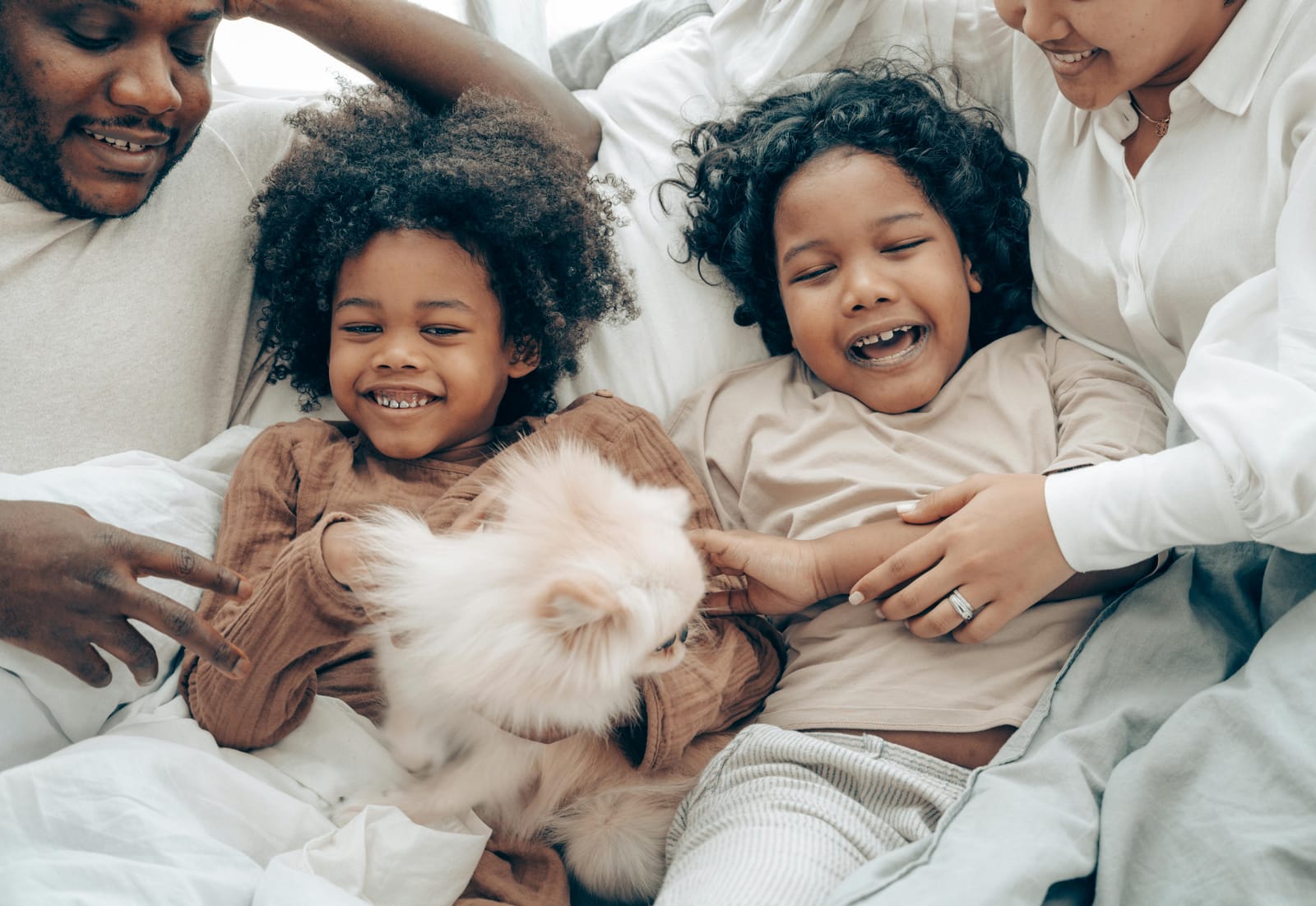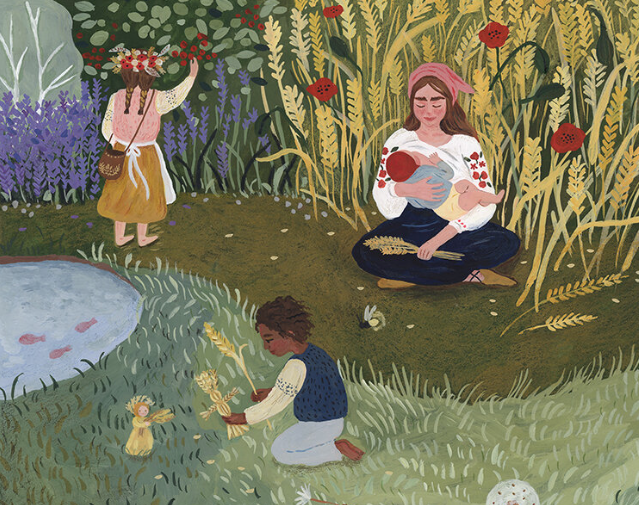Claire Chamberlain explores the benefits of pets
There are so many brilliant reasons why you might be considering a new addition to your home in the form of a furry, four-legged family member. It’s true that a cherished pet can truly complete a family. But as well as offering the animal in question a loving home for life, your pet will undoubtedly offer you and your children a host of money-can’t-buy benefits in return.
Families with pets may be more likely to be fitter and healthier! One 2023 study, published in the journal Frontiers in Public Health, found pet owners showed a higher frequency of physical activity than non-owners.
OK, this might apply more if you own a dog as opposed to a goldfish, but a four-legged family member is certainly a great way to ensure you all get out and about together in the fresh air. It doesn’t end at physical health, either.
A pet can be a wonderful mood-booster and help to soothe away anxiety – a 2019 study, published in the journal Animals, concluded that interacting with a pet dog considerably reduces anxiety and feelings of sadness, and also improves happiness scores.
Child psychologist, Dr Alison McClymont (@alisonmcclymontinsta), agrees that a pet can provide wonderful emotional support for children. “Pets are commonly used in therapy spaces as emotional support animals – and with good reason,” she says. “Pets offer unfaltering love and friendship, and in their non-verbal way can help calm a child, while offering an uninterrupting ear to listen to problems.”
The best teacher
Pet ownership goes beyond emotional support, though. By opening your home to a pet, you are inviting a creature into your lives that can serve as your child’s greatest teacher, helping them to grow in emotional maturity.
“A family pet offers a non-human attachment figure, and this wonderful relationship can teach a child about unconditional love, trust, empathy and loss,” says Dr McClymont. “A pet can be a companion, confidante and playmate. They also teach children responsibility – duty-caring for a pet can be a great way to encourage a child to take responsibility for something other than themselves.”
Pets and neurodivergent children
Of course, pets can be a wonderful addition to any family, but when you have a neurodivergent and/or chronically ill child, they can play an even more important role.
“In families with neurodivergent and ill children, [a pet’s presence] is even more significant, because these children may often be socially isolated or lonely due to a variety of factors, including bullying or long periods of absence from school due to ill health,” says Jane Green MBE, chair and founder of SEDSConnective (sedsconnective.org).
“A pet can both give and receive unconditional love for children who might not have a connection with any or many other children or adults.” Jane goes on to explain just how vital a pet can be when it comes to communication.
“Having a pet can help a neurodivergent child develop and improve effective communication, particularly as they start to learn their pet’s body language, which is much simpler to understand than complex and often confusing human body language,” she says. “It’s a great transferable skill, which they can apply to communicating with humans as they get older and start to develop better social cognition skills. But while in their safe space at home, their pet friend will not judge or reject them.
“You may also find that while your autistic child avoids eye contact with you and the other humans in their life, they will often be able to make eye contact with their pet. Harvard researchers have found this is because, for autistic people, eye contact can overstimulate the part of their brain responsible for reading emotions in other people’s faces, causing a feeling of stress, unease and discomfort.
But animal behaviours are much easier to interpret than confusing human social cues, and as long as your animal trusts your child, they won’t judge them for making eye contact for too long, either!”
Allergies and pet ownership
Jane says that while a pet can offer incredible support, it’s important to take potential allergies into account. However, that’s not to say your child can’t benefit from the support and presence of a pet: “Some children will be unable to have furry pets, due to atopic dermatitis, allergies linked to symptomatic hypermobility or immunodeficiency. In such cases, they might be able to have pets which have fewer allergens. Some cats and dogs are known for being less allergenic, due to the type of fur they have. Alternatively, there are pets that they don’t handle, such as fish.”
How to choose a pet
Looking to add a family pet to your household? Alyson Jones, director of rehoming and fostering services at Blue Cross has the following advice:
• Do your research: you might have a particular animal or breed in mind, but just because you like the look of it, it doesn’t mean it’s the best fit for your family. Every pet has its own personality, and some breeds of dog, for example, have strong traits. Focus on looking for a friendly, confident pet, rather than a particular breed.
• Small pet considerations: many people think all small pets are a good choice for children, but that’s not always the case. Some, like hamsters, are nocturnal, so won’t appreciate being woken when your child’s ready to play, while others, like gerbils, are quick and agile, and can be difficult for younger children to handle. Rats, on the other hand, often make great pets because they’re highly sociable.
• Never impulse buy: your new pet could live for anything from two to 20 years, so really consider the responsibility before purchasing.
• Think about your lifestyle: if you want a dog, but your family isn’t around during the day, who will look after it? If you want a cat, do you have safe outside space? It’s important to consider your future pet’s happiness and needs.
• Consider costs: remember, a pet can be a big financial commitment – make sure you factor in food bills, insurance and vet bills before taking the plunge!
• Why not adopt? There are thousands of animals in shelters like Blue Cross waiting for their forever home, so adopting is a wonderful option. An adult rescue pet is a great choice, as their personality is already established, so you can bring them home with greater confidence. For more information about finding the right pet, starting the adoption process or supporting the work of Blue Cross, please visit bluecross.org.uk.
Finley, 13 talks about his relationship with his cat
Finley, now 13, has autism and sensory processing disorder, so everyday life can be overwhelming. Coping with social anxiety, stress and isolation was a daily challenge and Finley was struggling to leave the family home. Desperate to help, Finley’s parents thought a cat might bring some comfort, so they brought rescue cat, Chi, into their son’s life.
The effect was remarkable – the pair bonded instantly, and Finley got the unconditional love and non-judgemental friendship he needed to thrive. The mutual bond between Finley and Chi has been truly transformative.
“Chi really is an ambassador for cats and helping more people understand what wonderful therapy they can be for children with autism spectrum disorder,” says Finley’s mum, Jo.
Finley was a finalist in Cats Protection’s National Cat Awards in 2019. Cats Protection is the UK’s leading cat welfare charity and holds the National Cat Awards every year. Check out cats.org.uk.







